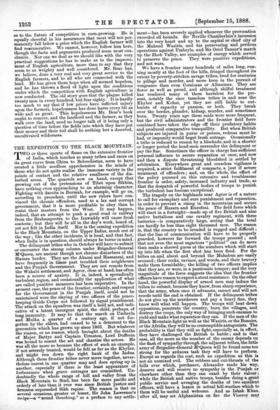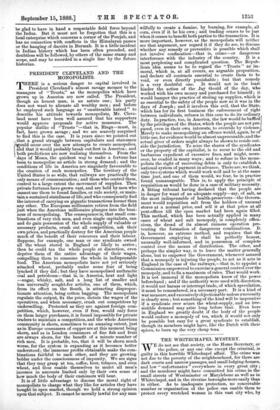THE EXPEDITION TO THE BLACK MOUNTAIN. T WO or three spurts
of flame on the extensive frontier of India, which touches so many tribes and races on its great curve from China to Beloochistan, seem to have created a little needless apprehension in the minds of those who do not quite realise the immense variety in the points of contact and the relative smallness of the dis- turbed areas. The quarrels now on hand, except that growing out of the pretensions of Tibet upon Sikkim, have nothing even approaching to an alarming character. Fighting with dacoits in Burmah, for example, will go on, according to precedent, until the new rulers have con- vinced the chronic offenders, used to a lax and corrupt government, that it is more profitable to obey than to resist their masters from the West. It may happen, indeed, that an attempt to push a good road or railway from the Brahmapootra to the Irawaddy will cause fresh contests ; but they will be all in the day's work, heard of, yet not felt in India itself. Nor is the coming expedition to the Black Mountain, on the Upper Indus, much out of the way ; like the other incidents, it is local, and that fact, when India is in question, should always be borne in mind. The delinquent tribes who in October will have to submit or encounter the strong column under Brigadier-General M`Queen, are ancient though not chronic disturbers of the Ilazara, border. They are the Akazai and Hassanzai, and have frequently in times past troubled their neighbours and the Punjab Government. They are not remote from the Wahabi settlement, and Agror, close at hand, has often been a source of anxiety. It is, indeed, a sporadically turbulent region, and occasionally the application of what are called punitive measures has been imperative. In the present case, the peace of the frontier, certainly, and respect for the Government in the Punjab itself, could not be maintained were the slaying of two officers of the peace- keeping Guide Corps not followed by signal punishment. The attack on the squadron was itself a bold act, and indi- cative of a latent insurgent spirit, the child, perhaps, of long immunity. It may be that the march on Umbeyla and Mulka a quarter of a century ago, if not for- gotten by the elders, had ceased to be a deterrent to the generation which has grown up since 1863. But whatever the reason, or no reason, which brought about the deaths of Major Battye and Captain Urmston, Lord Dufferin was bound to resent the act and chastise the actors. He was all the more so because the effect of such an example, if not severely treated, would be felt as far as the Khyber, and might run down the right bank of the Indus. Although these frontier tribes never move together, never- theless unrest in one quarter may and does spring up in another, especially if there is the least appearance of forbearance when grave outrages are committed. Un- doubtedly the whole range of hill and valley from the Black Mountain to Sind, has been far more pacific and orderly of late than it ever was since British justice and firmness superseded Sikh rapine. The reason is that on several occasions, greater or lesser, Sir John Lawrence's recipe—a " sound thrashing," as a preface to any settle- ment—has been severely applied whenever the provocation exceeded all bounds. Sir Neville Chaniberlain's incursion into the very heart and up to the capital or chief city of the Mahsud Waziris, and his persevering and perilous operations against ITmbeyla, and Sir Oriel Tanner's march up the Zhob Valley, are examples of energy which served to preserve the peace. They were punitive expeditions, and not wars.
We have a frontier many hundreds of miles long, run- ning mostly at the foot of the hills, fringed throughout its extent by poverty-stricken savage tribes, bred for centuries to pillage and murder, and more keen in the pursuit of vengeance than even Corsicans or Albanians. They are fierce as well as proud, and although skilful treatment has rendered many of them harmless for the pre- sent, notably the once tameless tribes in and near the Khyber and Kohat, yet they are still liable to out- bursts of rapacity or passion, or both. They break over the border, plunder, kidnap, murder, and sometimes burn. Twenty years ago these raids were more frequent, but the civil administrators and the frontier field force combined have taken the edge off their predatory habits and produced comparative tranquillity. But when British subjects are injured in purse or person, redress must be had, or impunity would beget fresh outrage. Occasionally a tribe is reduced to reason by a blockade, and in a shorter or longer period the head-men surrender the delinquent or pay the fine. Sometimes the officer in charge has sufficient personal influence to secure reparation at once, and now and then a dispute threatening bloodshed is settled by arbitration. Everywhere great and ceaseless vigilance is required, a strict fulfilment of compacts, a just if severe treatment of offenders ; and, on the whole, the effect of the policy pursued on this extensive and troublesome frontier is order, safety, increased industry and trade, so that the despatch of powerful bodies of troops to punish the turbulent has become exceptional.
The tragedy on the highlands near Agror is of a nature to call for exemplary and sure punishment and reparation, in order to prevent a rising in the mountains and secure the peace of Hazara and Eusufzai. The field force which will start in a fortnight--made up of five British and nine native battalions and one cavalry regiment, with three batteries—is comparatively large, seeing that the total can hardly be less than eight thousand men. The reason is, that the country to be invaded is rugged and difficult ; that the line of communication will have to be properly guarded, however far forward the troops proceed ; and that not even the most sagacious " political ' can do more than make a shrewd guess at the numbers which will start up into life when the first shot has been fired. For the tribes on and about, and beyond the Mahabun are easily aroused ; their rocks, ravines, and woods, and their bravery make them formidable ; the killing of two officers implies that they are, or were, in a passionate temper; and the very magnitude of the force suggests the idea that the frontier officers have reason to expect a stout resistance. On the other hand, the powerful display of armed men may induce the tribes to submit, because they know, from sharp experience, that the army, when once it advances, cannot and will not recede until the end is obtained. If the delinquent tribes do not give up the murderers and pay a heavy fine, they know well what will happen. The troops will beat down opposition, penetrate the country, burn the villages, and destroy the crops, the only way of bringing such enemies to yield and make what reparation they can. If the men of the Black Mountain fight as well as the Waziris, or the Buneirs, or the Afridis, they will be no contemptible antagonists. The probability is that they will so fight, especially as, in effect, they have challenged the British to battle ; and in that case, all the more as the number of the enemy depends on the flash of sympathy through the adjacent tribes, the little army of Brigadier-General M'Queen will be found none too strong for the arduous task they will have to perform. Except as regards the cost, such an expedition as this is not an unmixed evil. The robbers and cut-throats of the hills over which, perchance, Alexander made his way, deserve and will receive no sympathy in the Punjab or elsewhere other than they can exact by their valour ; while the British and native troops, besides doing a great public service and avenging the deaths of two excellent officers, will have a lesson in actual hill-warfare which to them will be useful and welcome. And as Ishak Khan, after all, may set Afghanistan on fire the Viceroy may be glad to have in hand a respectable field force beyond the Indus. But it must not be forgotten that this is a local enterprise which concerns a corner of the Punjab, and has no connection with conflicts in the Himalayan passes or the hanging of dacoits in Burmah. It is a little incident in Indian history which has been often preceded, and doubtless will be followed, by others of the same stamp and scope, and may be recorded in a single line by the future historian.



































 Previous page
Previous page